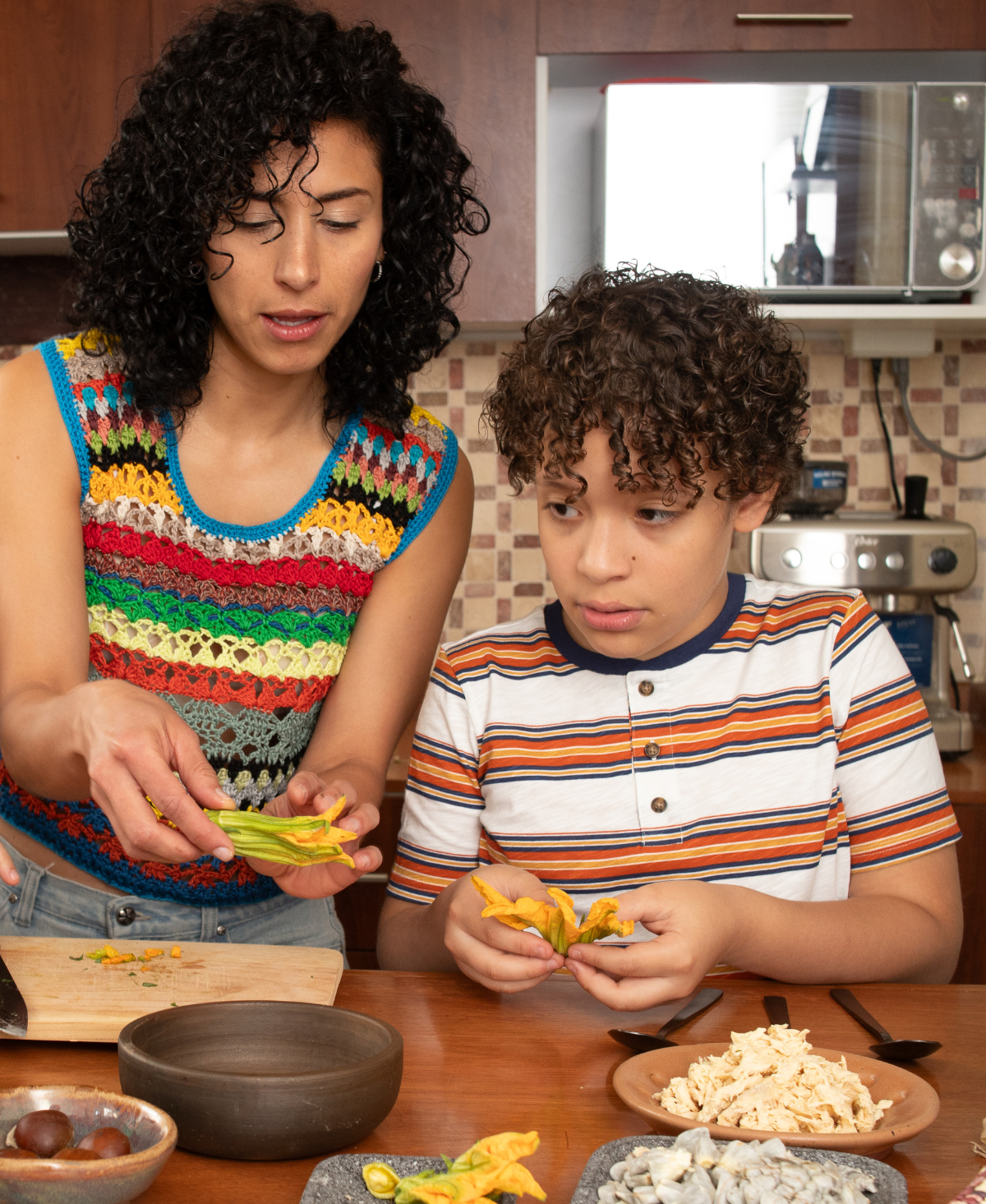Should I Make My Teens Attend Family Holiday Gatherings?
Roya Dedeaux, MS, LMFT
Should I Make My Teens Attend Family Holiday Gatherings?
The Question Parents Ask Me Every Holiday Season
Every single year around the holidays, I hear the same question from the worried, well-meaning parents in my office:
"Do I have to make my teen come to family holiday gatherings? Should I force them to show up?"
And every single year I give the same answer: it depends.

I know that sounds like a cop-out, I hate when people tell me that too. Luckily, what it depends on is largely in your control as a parent. Parenting during the teen years can feel so messy, in large part because the job of a teenager is to be intense in all sorts of ways - and part of that intensity is a push-pull of sometimes contradictory wants and needs.
Sometimes your teen wants you to toss them the car keys and act like they’re 40, and sometimes they are begging you to bring them a cup of water like they’re 3 years old and can’t possibly get it for themselves.
The teen years are a roller coaster of ups and downs, of feeling grown up and acting immature, of wanting space and needing security. Teens want to be independent and differentiate from their families…while also deep down, desperately wanting to still belong.
The holidays throw gasoline on that fire. You’ve got extended family expectations, cultural traditions, personal values, maybe religious beliefs, and your teen’s newfound need for independence all colliding in one crowded living room that smells like cinnamon rolls and tension.
So, should you make your teen attend? My short, blunt answer: no, not in the way you think.
You can’t strong-arm a teen into meaningful family connection. You can build the kind of relationship where your teen wants to participate—even if it’s just for a little while. That groundwork starts way before Pumpkin Spice Lattes roll back into town.
Let’s break this down.
Why Teens Push Back on Holiday Gatherings
First, let’s normalize what’s happening here. If your teen is resisting or outright refusing to go to family gatherings, it doesn’t automatically mean they’re disrespectful, lazy, antisocial, or rejecting you. More often than not, it means they’re:
1. Exhausted
The holidays come right when school stress is peaking. Finals, projects, sports, social drama. Then you add holiday chaos on top of it? Yeah, they’re fried.

2. Differentiating
This is the developmental task of adolescence. They
have to separate from you in order to become themselves. That means saying no to some things you love. Or things they’ve always loved in the past too.
3. Overstimulated
Crowded rooms, relatives asking a million personal questions, the pressure to “perform” socially. It’s a lot. Especially for a teen who isn’t sure what their next steps are.

4. Prioritizing Peers
Friends, crushes, and social circles take center stage in adolescence. It’s not a rejection of family, it’s brain wiring.
5. Needing Control
Teens are told what to do in almost every area of life. Pushing back on holiday plans is often one of the few levers they can pull.
Once you see it through this lens, their resistance makes a lot more sense.

A Little Goes A Long Way
Here’s the good news: you don’t actually need your teen to be the perfect family holiday participant.
As a parent, it’s easy to feel like you’re failing if your teen isn’t singing carols with Grandma or playing board games with their cousins until midnight. But I want you to take a deep breath and remember this:
A little goes a long way.
If your teen shows up for an hour, sits politely through dinner, takes their plate to the kitchen, and then retreats to scroll TikTok in the guest bedroom - that counts. That’s participation. That’s connection.
Stop aiming for
all in and start appreciating
good enough.
Building the Relationship BEFORE the Holidays
Here’s the part most parents don’t want to hear: whether your teen participates happily in holiday gatherings has almost nothing to do with the event itself.
It has to do with the relationship you’ve been building all year long.
- Do your teens feel respected and heard in your home?
- Do you give them some agency in decisions that affect them?
- Do you make space for their interests, even if they’re not your thing?
- Do you acknowledge that their world (friends, music, online communities) matters as much to them as your world (traditions, extended family, cultural rituals) matters to you?

If the answer is yes, you’ve been planting the seeds of cooperation. That’s what makes a teen more willing to compromise.
If the answer is no, you may find yourself in a power struggle come December. And let me tell you: forcing a sullen, resistant teen into Grandma’s living room rarely ends with holiday magic.
The Power of Compromise
Compromise is your best friend during the holidays. Here are some examples of how this might look in real life:
Time limits: “Come for dinner and dessert. After that, you can go hang with your friends.”
Bring a friend: Let them invite someone along. Yes, it might feel weird at first, but most extended families secretly love it when teens bring friends. It lightens the mood, gives your kid an anchor, and honestly, it’s way better than dragging them there solo while they sulk. Friends often are more verbal about appreciating your family’s traditions too. Pretend it’s like the friend is your teen’s spokesperson.
Alternate plans: “Come to Christmas Eve with us, and then you can skip Christmas morning brunch if you need to recharge.”

Flexible expectations: If they need to retreat after a while, let them. Adults do this too, by the way. We just call it “taking a nap” or “going for a walk.” My entire family is famous for everyone bringing two cars to each event - there’s always one adult who needs to head home before the other is ready!
Let them decide:
“You choose what we do together on Christmas Eve, it just matters to me that we do something together.”

What Not to Do
Alright, let me get blunt here. Parents mess this up in a few predictable ways. Please, for the love of peppermint bark, don’t do these:
Don’t guilt-trip. Telling your kid they’re “ruining the holidays” will not make them feel closer to you. It will make them resentful.
Don’t compare. “Your cousin Sara is always so cheerful!” Yeah, and your kid just heard, “I wish you were someone else.”
Don’t force performance. Don’t shove them into a talent show for Grandma or demand they wear matching sweaters if that’s not their vibe. If they’re showing up, let them show up exactly as they are.
Don’t make it about your reputation. Stop worrying about what Aunt Linda thinks. Aunt Linda can deal. If Aunt Linda can’t remember what it’s like to be a teenager, then… well. She needs more Pumpkin Spice and Everything Nice.

Recognizing Differentiation as Healthy
One of the hardest things about parenting teens is realizing that their resistance is healthy.
When they roll their eyes at traditions you hold dear, it stings. But it’s not a moral failure, it’s individuation. They’re figuring out who they are apart from you. That’s supposed to happen.
The more you can accept this, the less defensive you’ll feel, and the easier it will be to meet them halfway.
Sidebar: they’ll come back around. If you and your teenager can navigate these years in a healthy way…9 times out of 10 as they get older they’ll start looking at the family traditions fondly again. They might want to revisit things they haven’t done since they were little. They might become invested in creating an experience for younger family members, or take some ownership over part of the ritual.
When to Hold the Line
Now, some parents are probably thinking, “Okay, Roya, but are you saying my kid just gets to opt out of everything?”
No. Expectations still matter. There are times when you hold the line, not because you’re trying to control your teen, but because you’re teaching them how to be part of a family, or because it’s important to the family as a whole and it’s bigger than their individual, momentary want.
For example:
Safety issues:
They don’t get to skip out on the one driver in the snowstorm because they don’t feel like coming.
Core values:
If your family is religious and attending a holiday service is non-negotiable for you, you can require attendance, but still allow compromise on how long they stay or what else they participate in.
Basic respect:
They don’t get to swear at Grandma, slam cabinets, or ruin the day for everyone else. To me, this is part of the conversation of their whole lives. “I know you don’t love sitting at the dining room table, but it’s important to Grandma, and it’s a gift you can give to her and all of us. I appreciate you doing this for someone else even when it’s not your first choice.”
Think of it as, “We all show up in some way. What that looks like can be flexible.”

Real-Life Scenarios Parents Face
Scenario 1: The Sulking Teen
You manage to get your 15-year-old to the family party, but as soon as you walk in the door, they park themselves on the couch, hoodie up, scrolling on their phone. You feel embarrassed. Aunt Linda gives you that look.
What to do: Let them be. This is participation. They showed up. They’re in the room. That’s enough. Don’t make it a bigger deal. You set the tone of being light and accepting abut it, and Aunt Linda will fall in line. Or she’ll look like the rude one if she comments. You find security and conviction and don’t let yourself get rattled.
Scenario 2: The “I’d Rather Be With My Friends” Battle
Your 17-year-old wants to skip Christmas dinner entirely because their friends are having a party.
What to do: Compromise. “You need to come to dinner because that is really important to me, but after dinner is over you can go meet up with your friends. In fact, you should take them some dessert.”

Scenario 3: The Teen Who Wants to Bring a Friend
Your 14-year-old asks if their best friend can tag along to Grandma’s. You’re worried it will change the family vibe.
What to do: Say yes. Your teen will be more relaxed, more willing to participate, and honestly, Grandma might love the extra kid at the table.
Scenario 4: The Teen Who Opts Out Entirely
Your 16-year-old says they’re not coming to Christmas morning breakfast at all.
What to do: Decide if this is a hill worth dying on. Figure out if there are creative compromises or ways you can make it more bearable for them. Be curious about their resistance, and be open about how much it matters to you. Maybe you say: “It means a lot to me to have you there with us for the beginning of the day, but if you want to skip the rest of it that’s fine with me.”
Sample Scripts You Can Use
Sometimes you just need the words. Here are some simple, non-guilt-trippy phrases you can try:
“I want you with us, even just for a little while.”
“You don’t have to stay the whole time. Dinner and dessert is enough.”
“I get that you want to be with your friends. Let’s figure out how to make both work.”
“You can bring a friend. We’ll make room.”
“It matters to me that you show up, but it doesn’t have to be perfect.”
“I know this isn’t your favorite thing. Thanks for trying—I notice.”
“Thank you for being here with me. I love when you’re around.”
“I’m glad you picked this [non-traditional way to spend this time.] What matters to me is you, not the event.”
Reframing Success
I want you to ask yourself: what does success actually look like for your family this holiday season?
Is it really about your teen attending every single gathering, smiling in every single picture, and expressing gratitude to every single relative? Or is it about maintaining connection, honoring traditions, and creating space for everyone to feel seen?
Because here’s the truth: ten years from now, you’ll barely remember whether your teen spent three hours or thirty minutes at Grandma’s house. But you will remember whether you spent the whole holiday fighting about it. And so will they.
A Personal Note
I’ll be blunt: holidays can be emotionally loaded for me, too. As a therapist, I can sit here and preach perspective, but I’m also a mom. I have three kids, and I care deeply about traditions. I’ve had my moments of wanting to scream: “Why can’t you just show up and pretend to enjoy this for once?”
But every time I remember that my job isn’t to control them, it’s to build a family culture where they want to belong, the tension eases.
The best gift you can give yourself this season is letting go of the fantasy of perfect participation.
Final Thoughts
So, should you make your teens attend family holiday gatherings?
My answer: set up the kind of relationship where you don’t have to make them.
Accept that a little goes a long way.
Compromise and get creative.
Respect their differentiation.
Let them bring a friend.
Stop caring what Aunt Linda thinks.
Hold the line only where it truly matters.
Make it enjoyable for them when they do participate!
Your teen may not love every minute of the holidays, but if you play this right, they’ll look back someday and remember that you cared more about them than about appearances.
And that, my friends, is what family is actually about.

Want More Support?
If this resonated with you, I’d love to keep supporting you beyond this blog. Parenting teens through the launch years (that tricky time between dependence and independence) is a whole journey.
I’ve created a free resource just for parents like you: A Parent’s Guide to Navigating Launch Anxiety.

It’s a 40-page workbook full of exercises, tools, and strategies to help you stay connected while giving your teen the independence they need.
Click below to download your free copy and join my email list.
The holidays aren’t the only time this shows up, and you don’t have to do it alone.

Roya Dedeaux is a Licensed Marriage and Family Therapist with a focus on using creative tools like art, writing, and recreation as a way to help teens and their families navigate adulthood anxiety.
Roya loves running her private practice, her online art group for teens, and helping teens & their parents through her various workshops and webinars! When she's not doing that, she loves to make messes with her three wild & wonderful kids where they live and play hard in Southern California.
Check out more about Roya, therapist, author, & speaker at
www.launchanxiety.com


